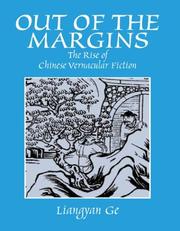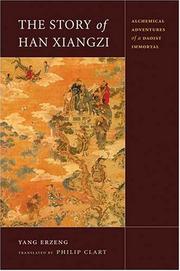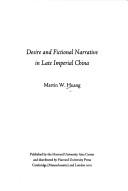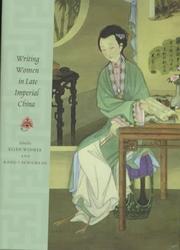| Listing 1 - 10 of 28 | << page >> |
Sort by
|
Book
ISBN: 9782070127269 2070127265 Year: 2010 Volume: 119 Publisher: Paris Gallimard
Abstract | Keywords | Export | Availability | Bookmark
 Loading...
Loading...Choose an application
- Reference Manager
- EndNote
- RefWorks (Direct export to RefWorks)
Book
ISBN: 9780231183079 9780231183062 9780231544733 0231544731 0231183062 Year: 2018 Publisher: New York, NY
Abstract | Keywords | Export | Availability | Bookmark
 Loading...
Loading...Choose an application
- Reference Manager
- EndNote
- RefWorks (Direct export to RefWorks)
In this Ming-era novel, historical narrative, raucous humor, and the supernatural are interwoven to tell the tale of an unsuccessful attempt to overthrow the Song dynasty. A poor young girl meets an old woman who gives her a magic book that allows her to create rice and money. Her father, terrified that his daughter's demonic nature might be discovered, marries her off. Forced to flee, she and others with supernatural abilities find themselves in the midst of a grotesque version of a historical uprising, in which facts are intermingled with slapstick humor and wild fictions.Attributed to the writer Luo Guanzhong, Quelling the Demons' Revolt is centered on the events of the rebellion led by Wang Ze in 1047-48. But it is a distorted, humorous version, in which Wang Ze's lieutenants show up as a comical peddler and a mysterious Daoist priest and a celebrated warrior appears despite having died many years earlier. Rather than fantastic adventures and supernatural marvels, the author points to human vanities and fixations as well as social injustice, warning of the vulnerability of any pursuit of order in a world plagued by demonic forces as well as mundane corruption. Although the story takes place long before the era in which it was written, ultimately Quelling the Demons' Revolt is the story of the Ming dynasty in Song masquerade, presciently warning of the dynasty's downfall. The novel is divided into chapters, but in many ways it is an arrangement of self-contained stories that draw on vernacular storytelling. This translation offers English-speaking readers a spirited example of social critique combined with caustic humor from the era of Luo Guanzhong.
Book
ISBN: 1438467095 9781438467092 9781438467078 1438467079 1438467087 Year: 2017 Publisher: Albany, NY
Abstract | Keywords | Export | Availability | Bookmark
 Loading...
Loading...Choose an application
- Reference Manager
- EndNote
- RefWorks (Direct export to RefWorks)
This book offers the first translation into English of the Chinese novel Haiyouji, as well as excerpts of a marionette play based on the cult lore of the goddess Chen Jinggu (766–790), a historical shaman priestess who became one of Fujian's most important goddesses and the Lüshan Sect's chief deity. The novel, a 1753 reprint of what is possibly a Ming dynasty novel, was both a popular fiction and a religious tract. It offers a lively mythological tale depicting combat between the shaman goddess and a snake demon goddess. Replete with the beliefs and practices of the cult of this warrior goddess, the novel asserts the importance of Shamanism (i.e., local religious beliefs) as one of the four religions of China, along with Confucianism, Buddhism, and Daoism. To further develop the links between literature and local religion, Fan Pen Li Chen includes translations of two acts from a Fujian marionette play, Biography of the Lady, featuring the goddess.

ISBN: 0824823702 Year: 2001 Publisher: Honolulu University of Hawaii press
Abstract | Keywords | Export | Availability | Bookmark
 Loading...
Loading...Choose an application
- Reference Manager
- EndNote
- RefWorks (Direct export to RefWorks)
S16/0418 --- China: Literature and theatrical art--Traditional novels: Ming: studies, texts and translations --- Shui hu zhuan. --- Schue hu dshwan --- Schui hu tschuan --- Shui hu chuan --- Shuihu zhuan --- Shwùy hoò chuen --- Suhŏji --- Suhojŏn --- Suikoden --- Syuhoji --- 水浒传 --- 水滸傳
Book
Abstract | Keywords | Export | Availability | Bookmark
 Loading...
Loading...Choose an application
- Reference Manager
- EndNote
- RefWorks (Direct export to RefWorks)
Book
ISBN: 7301064195 Year: 2003 Publisher: Beijing : Beijing da xue chu ban she,
Abstract | Keywords | Export | Availability | Bookmark
 Loading...
Loading...Choose an application
- Reference Manager
- EndNote
- RefWorks (Direct export to RefWorks)
S16/0418 --- S16/0419 --- China: Literature and theatrical art--Traditional novels: Ming: studies, texts and translations --- China: Literature and theatrical art--Traditional novels: Qing: studies, texts and translations --- Roman chinois --- Chinese fiction --- History and criticism. --- Histoire et critique

ISBN: 0295801948 9780295801940 9780295986906 0295986905 9780295987255 0295987251 Year: 2007 Publisher: Seattle : University of Washington Press,
Abstract | Keywords | Export | Availability | Bookmark
 Loading...
Loading...Choose an application
- Reference Manager
- EndNote
- RefWorks (Direct export to RefWorks)
In this seventeenth-century Chinese novel, Han Xiangzi, best known as one of the Eight Immortals, seeks and achieves immortality and then devotes himself to converting his materialistic, politically ambitious Confucian uncle—Han Yu, a real historical figure—to Daoism. Written in lively vernacular prose interspersed with poems and songs, the novel takes its readers across China, to the heavens, and into the underworld. Readers listen to debates among Confucians, Daoists, and Buddhists and witness trials of faith and the performance of magical feats. In the mode of the famous religious novel Journey to the West, The Story of Han Xiangzi uses colorful characters, twists of plot, witty dialogue, and action suitable for a superhero comic book to convey its religious message—that worldly life is ephemeral and that true contentment can be found only through Daoist cultivation.This is the first translation into any Western language of Han Xiangzi quanzhuan (literally, The Complete Story of Han Xiangzi). On one level, the novel is a delightful adventure; on another, it is serious theology. Although The Story of Han Xiangzi’s irreverent attitude toward the Confucian establishment prevented its acceptance by literary critics in imperial China, it has remained popular among Chinese readers for four centuries.Philip Clart’s introduction outlines the Han Xiangzi story cycle, presents Yang Erzeng in his social context, assesses the literary merits and religious significance of the text, and explores the theory and practice of inner alchemy. This unabridged translation will appeal to students of Chinese literature and to general readers who enjoy international fiction, as well as to readers with an interest in Daoism.
Book
ISBN: 9789629964580 9629964589 9629969696 Year: 2011 Publisher: Hong Kong Chinese University Press
Abstract | Keywords | Export | Availability | Bookmark
 Loading...
Loading...Choose an application
- Reference Manager
- EndNote
- RefWorks (Direct export to RefWorks)

ISBN: 0674005139 1684173574 Year: 2001 Publisher: Cambridge (Mass.): Harvard university press
Abstract | Keywords | Export | Availability | Bookmark
 Loading...
Loading...Choose an application
- Reference Manager
- EndNote
- RefWorks (Direct export to RefWorks)
S16/0195 --- S16/0418 --- S16/0419 --- S11/0740 --- China: Literature and theatrical art--Thematic studies --- China: Literature and theatrical art--Traditional novels: Ming: studies, texts and translations --- China: Literature and theatrical art--Traditional novels: Qing: studies, texts and translations --- China: Social sciences--Sexual life: general and before 1949 --- Chinese fiction --- Sex in literature. --- History and criticism. --- Sex in literature --- History and criticism

ISBN: 0804728720 Year: 1997 Publisher: Stanford (Calif.): Stanford university press
Abstract | Keywords | Export | Availability | Bookmark
 Loading...
Loading...Choose an application
- Reference Manager
- EndNote
- RefWorks (Direct export to RefWorks)
S16/0195 --- S16/0419 --- S16/0418 --- S16/0230 --- China: Literature and theatrical art--Thematic studies --- China: Literature and theatrical art--Traditional novels: Qing: studies, texts and translations --- China: Literature and theatrical art--Traditional novels: Ming: studies, texts and translations --- China: Literature and theatrical art--Poetry: Ming - Qing --- Chinese literature --- Women and literature --- History and criticism. --- Women authors --- History and criticism --- Women authors&delete&
| Listing 1 - 10 of 28 | << page >> |
Sort by
|

 Search
Search Feedback
Feedback About UniCat
About UniCat  Help
Help News
News